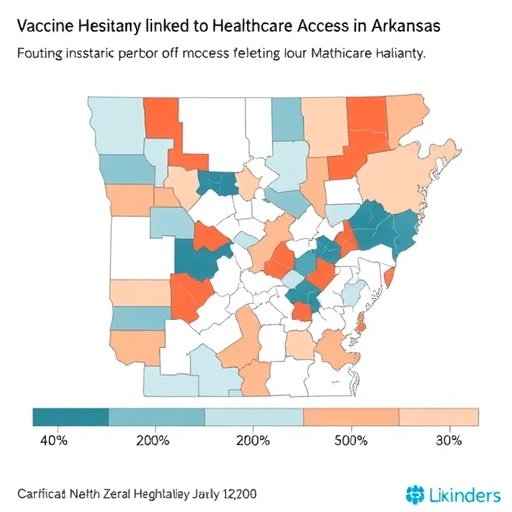In a rapidly evolving landscape of healthcare, the intersection of vaccine hesitancy and access to healthcare resources has emerged as a pressing public health concern. As communities grapple with the decision to vaccinate, a startling correlation has been unveiled that highlights significant disparities across different demographics in Arkansas. The forthcoming publication in the Journal of General Internal Medicine draws attention to these associations, painting a stark picture of the challenges faced by many Arkansans. This revelation not only sheds light on local issues but also resonates with global discussions regarding vaccine acceptance amid ongoing health crises.
The study focuses on identifying the underlying factors that contribute to vaccine hesitancy amongst the Arkansas population. Vaccine hesitancy is characterized by a reluctance or refusal to vaccinate despite the availability of vaccines. This phenomenon can be attributed to a multitude of factors, including mistrust in the medical community, misinformation, and socio-economic barriers that limit access to healthcare. By investigating the various dimensions surrounding this issue, the researchers aim to uncover the deeper implications of these disparities for public health and policy-making.
One critical aspect discussed in this research is the relationship between healthcare access and vaccine hesitancy. The authors illustrate how limited access to healthcare services can exacerbate the reluctance to receive vaccinations. Arkansans living in rural areas, for instance, often contend with insufficient healthcare facilities, making it challenging for them to obtain necessary vaccinations. This geographical limitation is an essential component in understanding the complexities of healthcare disparities and the resultant public health implications.
Complementing this analysis, the researchers also delve into the socio-economic determinants that influence vaccine hesitancy. Economic instability, educational disparities, and cultural factors play integral roles in shaping individuals’ attitudes towards vaccination. For instance, individuals from lower socio-economic backgrounds may be more susceptible to vaccine misinformation due to limited access to reliable information sources. This finding highlights the urgent need for public health initiatives that address these socio-economic barriers and promote equitable healthcare access.
Importantly, the role of social networks and community connections in influencing vaccine decisions is underscored throughout the study. The authors reveal that individuals often rely on peer opinions and social media for guidance regarding vaccinations. Misinformation disseminated through these channels can significantly impact public perception and, consequently, vaccination rates. Therefore, fostering accurate communication and education within communities is paramount in combating vaccine hesitancy.
Furthermore, the research emphasizes the critical role of healthcare providers in influencing vaccination decisions. The quality of interactions between patients and healthcare professionals can shape patients’ perceptions and willingness to vaccinate. Trust in healthcare providers is essential; thus, building strong, trusting relationships can aid in bridging the gap between vaccine hesitancy and acceptance. The authors advocate for enhanced training for healthcare professionals to better address vaccine concerns and provide clear, factual information.
The study also highlights the demographic variations in vaccine hesitancy, noting that different groups may respond to interventions in distinct ways. For instance, younger populations may display varying degrees of openness towards vaccination compared to older generations. This variance underscores the importance of tailoring public health messaging that resonates with diverse age groups and cultural contexts. It serves as a reminder that one size does not fit all when it comes to health communications.
In light of these findings, the authors stress the urgent need for policymakers to take actionable steps to improve healthcare access and reduce vaccine hesitancy. Strategies such as community outreach programs, increased funding for rural healthcare facilities, and public awareness campaigns can serve as effective tools in addressing these disparities. By implementing comprehensive public health strategies, it is possible to create an environment where vaccinations are both accessible and accepted.
As a society, the collective responsibility to address vaccine hesitancy goes beyond individual choices; it engages various sectors, including education, media, and community organizations. A robust, multifaceted approach that fosters collaboration among these stakeholders is essential in combating the larger public health threat posed by vaccine hesitancy. By prioritizing community engagement, transparency, and empathy in public health messaging, it is feasible to create a more informed and healthier populace.
The conversation around vaccine hesitancy will undoubtedly continue to evolve, especially in the face of new health challenges and emerging variants. Continuous research, such as this compelling study, is crucial in understanding public sentiment and framing health policy responses. Researchers, healthcare providers, and policymakers must remain vigilant in monitoring trends and patterns of vaccine hesitancy to ensure timely interventions.
Ultimately, the implications of this research extend far beyond the borders of Arkansas. As vaccine hesitancy remains a global concern, the lessons learned from this study can inform public health strategies that transcend regional boundaries. The interconnectedness of human health and societal actions presents an opportunity to foster a more resilient healthcare environment—one that prioritizes access, education, and trust in vaccination.
In conclusion, McElfish et al.’s investigation into the associations between vaccine hesitancy and healthcare access shines a critical light on an urgent public health issue. It serves as a call to action to understand and address the underlying factors contributing to vaccine hesitancy, ensuring that every individual has equitable access to life-saving vaccinations. The future of public health may very well depend on our ability to confront these challenges and foster an informed society that embraces vaccination as a cornerstone of health and wellbeing.
Subject of Research: Vaccine Hesitancy and Healthcare Access in Arkansas
Article Title: Correction: Associations Between General Vaccine Hesitancy and Healthcare Access Among Arkansans
Article References:
McElfish, P.A., Selig, J.P., Scott, A.J. et al. Correction: Associations Between General Vaccine Hesitancy and Healthcare Access Among Arkansans.
J GEN INTERN MED (2025). https://doi.org/10.1007/s11606-025-09948-y
Image Credits: AI Generated
DOI:
Keywords: Vaccine Hesitancy, Healthcare Access, Public Health, Arkansas, Socio-economic Barriers




